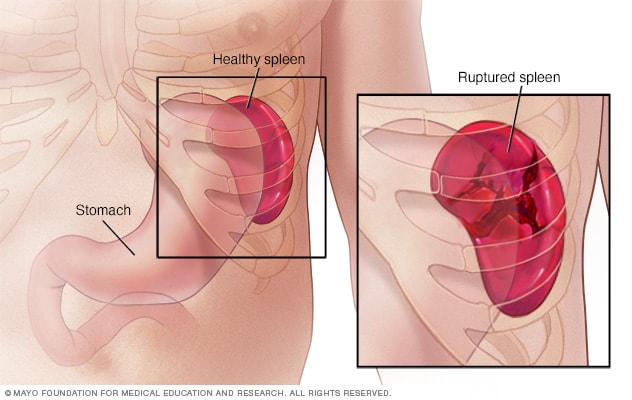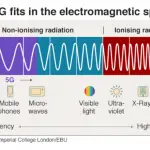Last Updated on 1 year by Francis
When it comes to the human body, some of the organs are more vulnerable to injury than others. The spleen is one of those organs that is particularly susceptible to damage, and a rupture of the spleen can be life-threatening. If you or someone you love has ruptured their spleen, it is important to understand the symptoms, treatment, and potential long-term effects. In this article, we’ll discuss what happens if you rupture your spleen and how to best manage the condition.
If you rupture your spleen, it can cause severe internal bleeding and may even be life-threatening. Treatment options depend on the severity of the rupture, but may include surgery to remove or repair the spleen, or to stop the bleeding. In some cases, a blood transfusion might be necessary to replace lost blood. In addition, you may need to take antibiotics to prevent infection or have other treatments such as radiation or chemotherapy.

Contents
What Happens When You Rupture Your Spleen?
A spleen rupture is a serious medical emergency. It can occur due to physical injury or as a result of a medical condition such as an autoimmune disorder. When the spleen ruptures, it can cause a life-threatening amount of internal bleeding. Symptoms of a spleen rupture include abdominal pain, dizziness, and difficulty breathing. It is important to seek medical attention immediately if you suspect you have ruptured your spleen.
The spleen is an organ located on the left side of the abdomen near the stomach. It is part of the body’s immune system and helps to filter out old or damaged blood cells. It also helps to fight infection and is responsible for producing antibodies.
When a spleen ruptures, the blood vessel associated with it will tear and bleed into the abdominal cavity. This can lead to severe internal bleeding. Symptoms of a ruptured spleen include sharp, sudden abdominal pain, dizziness, and difficulty breathing. The amount of bleeding can be life-threatening and requires immediate medical attention.
Causes of Spleen Rupture
The most common cause of a ruptured spleen is physical trauma such as a car accident or a fall. The spleen can also rupture due to medical conditions such as mononucleosis, liver disease, or cancer. In some cases, a spleen rupture can occur spontaneously without any known cause.
The spleen is susceptible to physical injury due to its position in the abdomen. It is surrounded by the rib cage and can be easily damaged during a blunt force trauma such as a car accident. The spleen is also susceptible to injury from a knife or gunshot wound.
In some cases, a medical condition can cause a spleen rupture. Mononucleosis is a common cause of a ruptured spleen. This condition is caused by the Epstein-Barr virus and can lead to an enlarged spleen. The spleen can become so large that it ruptures. Liver disease and cancer can also lead to a ruptured spleen due to the enlargement of the organ.
Diagnosis and Treatment of Spleen Rupture
If you experience any of the symptoms of a spleen rupture, it is important to seek medical attention immediately. Your doctor will perform a physical examination and ask about your symptoms. You may also need to undergo imaging tests such as an X-ray, CT scan, or ultrasound to determine if your spleen has ruptured.
If a spleen rupture is confirmed, you will need to undergo surgery to repair it. During the surgery, the surgeon will repair the torn blood vessel and stop any internal bleeding. In some cases, the spleen may need to be removed if the damage is too extensive.
After the surgery, you will need to take it easy and avoid any strenuous activity. You may also need to take antibiotics to prevent infection. Depending on the extent of the damage, you may need to stay in the hospital for several days.
Complications of a Spleen Rupture
A ruptured spleen can lead to life-threatening complications such as infection and internal bleeding. If the spleen is removed, you may be more susceptible to infection since the spleen is an important part of the immune system. You may also develop anemia due to insufficient red blood cells.
Infection
When the spleen ruptures, bacteria from the abdominal cavity can enter the bloodstream and cause a serious infection. This can lead to sepsis, a life-threatening condition that can result in organ failure and death.
Internal Bleeding
A ruptured spleen can lead to severe internal bleeding. This can cause a drop in blood pressure and lead to shock and organ failure. If the bleeding is not stopped, it can be life-threatening.
Preventing a Spleen Rupture
The best way to prevent a spleen rupture is to avoid physical trauma such as car accidents or falls. If you have a medical condition such as mononucleosis, liver disease, or cancer, it is important to follow your doctor’s instructions and take any prescribed medications. This can help to prevent the spleen from becoming enlarged and rupturing.
Frequently Asked Questions
What is a Spleen?
The spleen is an organ located in the upper left side of the abdomen, next to the stomach. It is a part of the lymphatic system, which helps to filter blood and store red blood cells. The spleen also produces antibodies that help fight infections and remove old or damaged cells from the blood.
What Causes a Spleen to Rupture?
A spleen can rupture due to a variety of causes, including blunt force trauma, such as a car accident, or a fall. Other causes can include infection, cancer, or even medical procedures. A ruptured spleen is considered a medical emergency and requires immediate treatment.
What Are the Symptoms of a Ruptured Spleen?
The most common symptom of a ruptured spleen is sudden and severe abdominal pain. Other symptoms may include dizziness, lightheadedness, nausea, and vomiting. Depending on the severity of the rupture, a person may also experience shortness of breath, low blood pressure, and rapid heartbeat.
What Are the Risks of a Ruptured Spleen?
A ruptured spleen can lead to internal bleeding and shock, which can be life-threatening if not treated quickly. If a person experiences a rupture, they should seek medical attention immediately. Without treatment, a person could experience severe blood loss and organ failure.
How is a Ruptured Spleen Treated?
Treatment for a ruptured spleen typically includes surgery to repair the organ and stop the bleeding. In some cases, the spleen may need to be removed, a procedure known as a splenectomy. Medication may also be prescribed to help prevent infection.
Can a Ruptured Spleen be Prevented?
Most ruptured spleens cannot be prevented, as they are usually caused by accidents or medical procedures. However, taking precautions to prevent accidents, such as wearing a seatbelt when driving and being mindful of one’s surroundings, can help reduce the risk of a rupture. Additionally, regular medical check-ups and screenings can help to detect any underlying medical conditions that may lead to a rupture.
How do you know if your Spleen is ruptured?|How long does it take to bleed out from Ruptured Spleen?
In conclusion, a ruptured spleen is a serious medical condition that requires immediate medical attention. If the spleen is ruptured, the patient is at a higher risk of infection and other serious complications. It is important to be aware of the warning signs of a ruptured spleen, including sharp abdominal pain, abdominal swelling, and dizziness, so that you can seek immediate medical care if needed. Prompt and appropriate medical care is essential for a successful recovery from a ruptured spleen.








